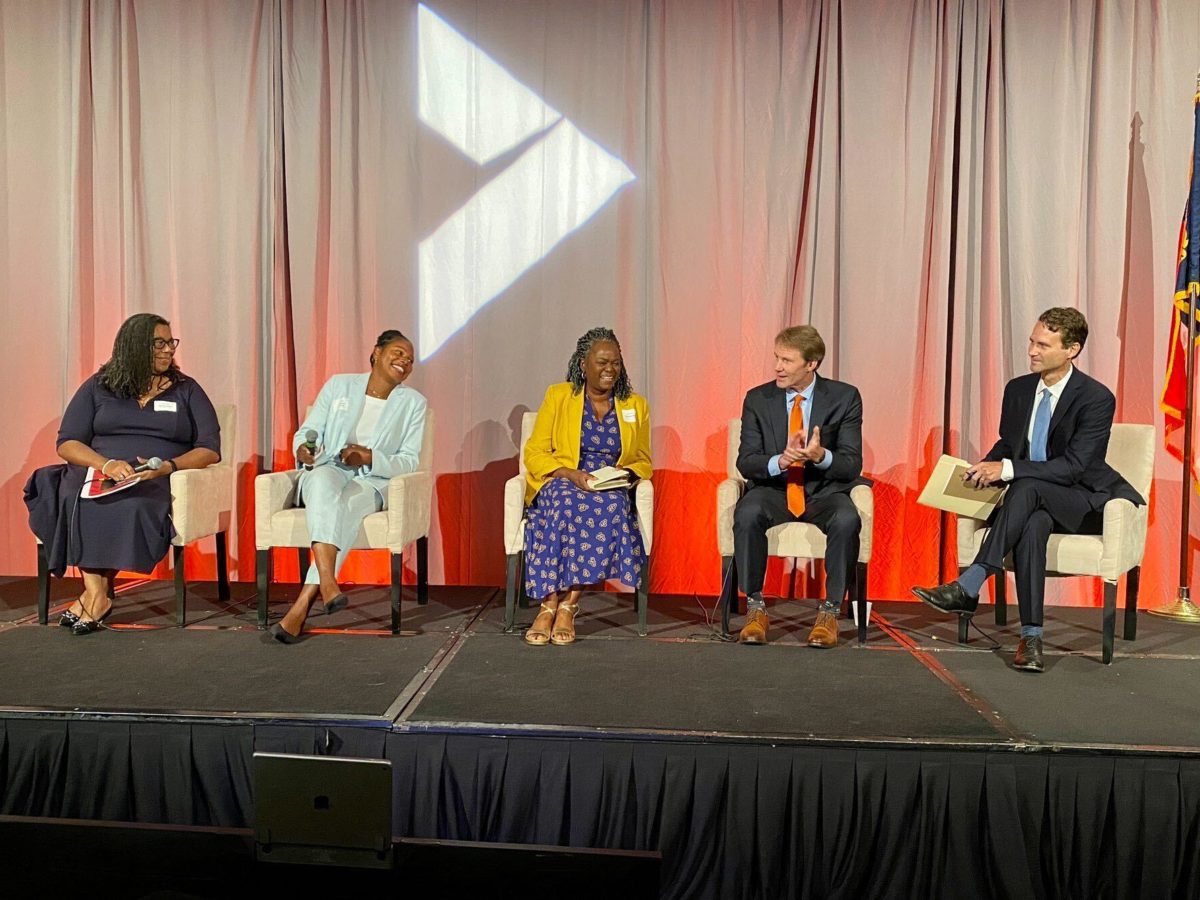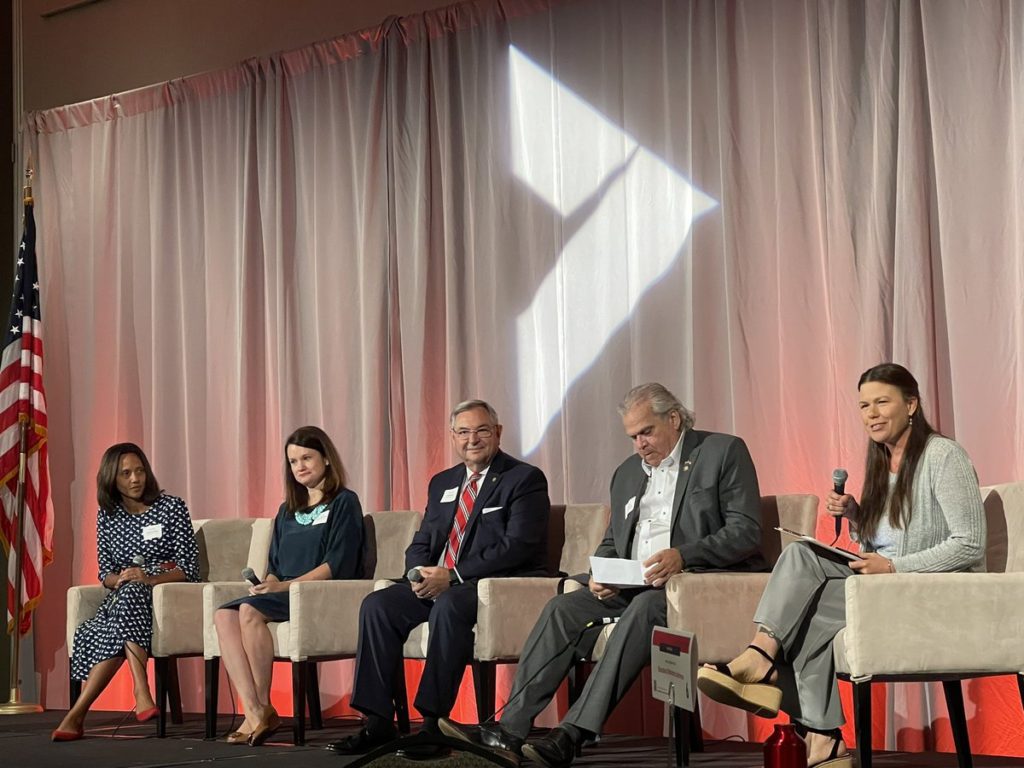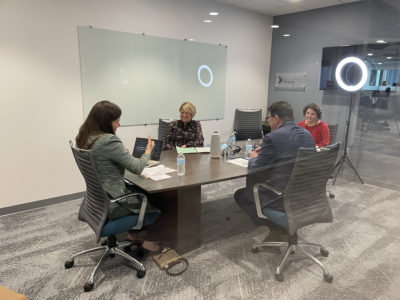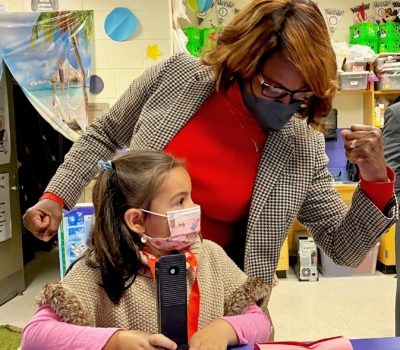
|
|
State business and education leaders gathered in Durham on Thursday to discuss how to develop a diverse and competitive state workforce at the N.C. Chamber’s “Education and Workforce Conference.”
Debra Derr, N.C. Chamber director of government affairs, welcomed attendees to a “collaborative and critical” convening. The state’s education system must be aligned with its labor market, she said.
“We need an education system that’s aligned with our business communities, so students feel well-prepared to forge their paths ahead post high school,” Derr said. “Ones that fit them – whether that’s attending a four-year college or trade school or obtaining high-quality credentials.”
Event speakers and panelists addressed each juncture of education – early childhood, K-12, and the postsecondary level. Advocates for early childhood education said that more accessible pre-K options help workers, which in turn helps businesses. Educators and leaders from the K-12 and college levels said clearer career pathways give students more options.
N.C. Chamber, a business advocacy organization, stressed that moving the needle on the state’s workforce shortage requires education partnerships – and vice versa. Serving the state well requires collaboration, agility, resiliency, and partnerships, speakers said.
Despite some recent declines in unemployment rates, there is still a gap between state residents without jobs and state employers in need of workers, said N.C. Chamber Foundation President Meredith Archie. Recent data shows more than 200,000 in the state are unemployed, she said, but there are more than 400,000 job openings. Increasing workforce competitiveness, Archie said, is one way to respond to shifting employee priorities and child care and elder care shortages.
“The challenges are multifaceted, meaning that the solutions will be layered, and will require an unwavering bias for action,” Archie said. “We believe that it’s important to share the great work that’s already taken place in the state and replicate it or scale it in other regions.”
‘Structured process’ to develop talent
The state can transform its workforce challenges into opportunities, said Jaimie Francis, vice president of policy and programs at the U.S. Chamber.
Francis discussed Talent Pipeline Management (TPM), a national program that helps businesses transform their workforce pipelines. The program aims to create better channels for potential employees through short-term and long-term strategies and partnerships.
“It’s going to take all of us,” Francis said. “We’re going to need the employers in our industries to be really vocal about what their talent challenges are so that we can turn those challenges into opportunities and into solutions that will better serve students and workers, that will promote better partnerships for education and training.”
Considering diversity, equity, and inclusion should be a priority for businesses as they do this work, she said, “not a backburner.” Workforce diversity means a business is attracting employees across all its communities. Such diversity is often possible due to the creation of partnerships between business and education communities, she said. Diversity was emphasized by many speakers at the conference.
The talent pipeline includes six main strategies:
- Organize for employer leadership and collaboration
- Project critical job demand
- Align and communicate job requirements
- Analyze talent supply
- Build talent supply chains
- Engage in continuous improvement/resiliency planning
“I’m sure many of you in the room are thinking to yourself, ‘This sounds just like every workforce development approach that I’ve heard of,’” Francis said. “What we need to do is to have a structured process that will move us from conversation into taking action. And that’s what TPM is really about, is providing that guidance, that framework, that playbook if you will, to say, ‘No matter where you’re at, we will meet you.’”
Linking workforce and K-12
The “portrait of a graduate” is an effort in North Carolina to focus on a graduate’s mindsets and skills over their test scores, Kristie Van Auken told attendees.
VanAuken, special advisor to state Superintendent of Public Instruction Catherine Truitt, said that portrait includes competencies such as communication, adaptability, and an alertness mindset. Such skills help prepare students for civic life, careers, or college, she said.
Truitt and N.C. Chamber President Gary Salamido have previously discussed improving alignment between North Carolina’s K-12 public school system and its workforce. In January, Truitt declared 2022 as “the year of the workforce.”
Anna Jones, co-founder of Triangle-based nonprofit District C, said it is important to prepare the next generation of diverse talent for modern work. District C does this through what it calls “teamships” – like an internship, but focused on team-based problem solving. Jones said this real-life experience problem solving gives students more directly transferable skills for work.
“When you go get out of that internship and apply for that job, because the half-life of skills is so short, this specific skill that I learned, changed,” she said.
VanAuken stressed the diversity of the state at both the K-12 and postsecondary level. Another panelist, MyFutureNC’s Cynthia Liston, discussed the need for more parity between financial aid for non-degree and degree credentials.
“North Carolina, as we all know, is a very diverse state, and it’s important that we lift up every child as we think about these great careers,” VanAuken said. “How do we ensure that every child has access to these great jobs that are growing up in our state?”
‘Stay the course’ on education attainment
North Carolina has an educational attainment goal of reaching 2 million residents aged 25 to 44 with a meaningful, high-quality credential or postsecondary degree by 2030. That’s about 67% of adults in that age bracket, according to projections from Carolina Demography.
Legislators spoke about what it will take to move the needle on that goal in a conversation moderated by EdNC CEO and Editor-in-Chief Mebane Rash.

The work must start early, Rep. Ashton Clemmons (D-Guilford) said, lifting up early education efforts in her county. The biggest return on investment for education efforts is when it starts at the pre-K level, she said.
CNBC ranked North Carolina the “top state for business” in 2022 – a fact highlighted several times at Thursday’s conference. On the other hand, the 2022 Kids Count Data Book placed North Carolina 34th among the states in child well-being.
N.C. Early Childhood Foundation Executive Director Muffy Grant briefly spoke about the need for affordable and quality child care in the state near the end of the conference.
Grant said that while “North Carolina is known as an innovator in early childhood,” data shows more work needs to be done to improve literacy and proficiency for children. Children of color often score lower on such benchmarks than white children, she said.
“This is our future workforce. What does that mean for our 2030 achieving goals? It’s time to change trajectory to ensure that all children have the opportunity to reach their full potential. And we need to understand that they don’t live in a vacuum – they live in the context of their families and their communities.”
Muffy Grant, executive director of N.C. Early Childhood Foundation
Sen. Sydney Batch (D-Wake) highlighted the success of early colleges and apprenticeships in the state to serve students.
Meeting the ever-changing needs of our business community requires a commitment to academic readiness, college and career access, post secondary completion, and adult learners, Rash said.
“This attainment goal binds us together locally, it binds us together statewide, it orients our passion toward the future,” Rash said. “Stay the course.”
Success stories
State education leaders highlighted “success stories in action” – focusing on adult learners, diversity and inclusion, and the importance of partnerships.
Durham Technical Community College President J.B. Buxton spoke about a new workforce development collaboration with Wake Technical Community College called RTP Bio. That partnership, which recently secured a $1.2 million federal grant, is an effort between the two colleges to unite their biotechnology, biomanufacturing, and biopharmaceutical talent pipelines.
“Community colleges are kind of like the kids in the sandbox. We actually play really well together, we just have really clear lines of division,” Buxton said. “What RTP Bio between Wake Tech and Durham Tech is trying to do is wipe out those lines and not just play well together, but build things together.”
Marilyn Chism, economic nonprofit Golden LEAF Foundation’s director of programs, lifted up adult learner initiatives to take advantage of the competencies and skills people have, regardless of their education level.
Two-year community college programs aren’t the right fit for all people, she said. Offering short-term training programs is important, too.
“How do we meet those students where they are?” Chism asked.
Dr. Rosalind Dale, vice provost for engagement and outreach at North Carolina A&T State University, talked about the importance of corporate partnerships to diversify the state’s workforce. North Carolina A&T partners with Guild Education, an upskilling platform, to offer certificate programs and online programs to employees at Walmart, Disney, and waste management businesses, for example.
A&T also recently announced $23.7 million federal grant to expand a workforce development program targeted to train workers in 16 N.C. counties for careers and good paying jobs in clean energy.
Jacqueline Browning, director of diversity, equity, and inclusion at American Tower, highlighted such partnerships as ways to “go deeper.” American Tower is a real estate investment trust and Fortune 500 company with operations in North Carolina.
“We need to rethink what partnership looks like,” Browning said.
Panelists said successful partnerships include collaboration, regionalization, learning, and student-centered processes. These partnerships connect people to opportunity by mitigating barriers to education – such as child care, Buxton said – and offering more integrated approaches.
Wraparound supports are especially important for adults, said Dionne McGee, project manager of revitalization project Hayti Reborn, during a subsequent panel on nontraditional employees. Onboarding adults looks different than onboarding younger people, those panelists said.
“If we do it right, it’s a win-win for everyone,” Browning said.
Housing and immigration
The conference concluded with brief discussions on the intersection of housing, child care, and immigration issues with workforce development.
Dr. Patrick Graham, chief executive officer of affordable housing agency WeBuild Concord, said segregation and gentrification in neighborhoods leads to segregated schools. Housing not only determines where you live, he said, but also where you are educated. Housing also determines a person’s proximity to job, services, and quality of life and talent development, he said.
Graham argued for a quality and affordability mindset when it comes to housing, not a quality versus affordability one.
“If you don’t address those things – as an employer, as a worker, or anyone else in economic development about the threat or issue of housing,” he said, “you will often find yourself struggling.”
Elaine Utin, co-founder and executive director of LatinxEd, also spoke about the relationship between immigration and labor.
Utin called for “radical imagination” to build education systems that better serve immigrant and Hispanic and Latino communities. Without representation in leadership, she said, many students of color can’t connect to their own history in the classroom. Many of these students have to “check their culture at the door” when entering education spaces, she said.
Utin called for stakeholders to listen to communities outside of their own when developing solutions. Those closest to the problem are closest to the solution, she said. In the context of North Carolina’s education attainment and workforce goals, she said the Latinx population is a critical part.
“You cannot reach that goal without our community,” she said. “We have to recognize that immigration is a natural human occurrence. … It’s an opportunity for us to grow together to learn new ways of dealing with diversity, equity, inclusion and belonging. These are critical pieces of the puzzle. We are all part of that and there’s room for all of us.”
N.C. Department of Commerce Secretary Machelle Sanders reiterated this connection between education and workforce during her closing keynote.
Education and workforce are economic development, she said. Sanders highlighted the department’s First in Talent Plan, which provides recommendations for economic development in the state. Access to broadband and child care are included in that plan, which emphasizes the importance of equity and diversity.
“We are North Carolinians, and we are going to do the things that lift this state up. …Collaborate more, engage more, coordinate and align more and build a stronger unshakable community for space through your actions,” Sanders said. “And there are better days ahead for our education and workforce system.
Editor’s note: EducationNC was a bronze sponsor for the conference.







